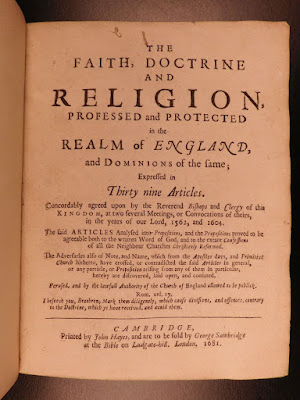
Jerry Ogles
Presiding Bishop
Anglican Orthodox Communion Worldwide
We are oft fortunate to get copies of Bishop Jerry’s sermon notes. Today is one of those Sundays.
As members of the Anglican Orthodox Church Worldwide Communion, Scripture is our primary reference. But, what positions do we take based on that Scripture? We have adopted The Thirty-Nine Articles of Religion. They were not intended as a complete statement of the Christian faith, but of the position of the Anglican Church in relation to the Roman Catholic Church and other Protestant churches.
It is critical you understand the Articles. Bishop Jerry has embarked on a series to cover them. They are about ten minutes or so, you should take the time to listen to them
Introduction
https://www.youtube.com/watch?v=dc6cR06ildA
Article One – The Triune God
https://youtu.be/x0Wp8ytia50
Bishop Jerry does videos on various subjects, they last just under ten minutes and this weeks are listed below:
Zacchaeus - a Man who Ran to find Christ - https://youtu.be/khkIOScz7O8
Today’s sermon starts off with the collect, and like always, it will give you a lot to consider in your heart.
The Sunday after Ascension Day.
The Collect.
GOD, the King of glory, who hast exalted thine only Son Jesus Christ with great triumph unto thy kingdom in heaven; We beseech thee, leave us not comfortless; but send to us thine Holy Ghost to comfort us, and exalt us un-to the same place whither our Saviour Christ is gone before, who liveth and reigneth with thee and the same Holy Ghost, one God, world without end. Amen.
The Collect
Our Collect for Sunday after Ascension follows logically the observance of the Ascension of the Lord Jesus Christ. It is perfectly timely and natural that we, having observed our Lord ascend, should now desire the promised comforter - I will not leave you comfortless: I will come to you. (John 14:18) This word ‘leave means, in the Greek, to divorce or to sever all legal connection. Christ will not disown His people even if He has departed to a High Station. Many of our friends may forget who we are if they advance to high political or social office, but not our Lord Jesus Christ. His very Ascension was for our benefit. We have been left with a close and intimate intercessor who will ALWAYS testify of Christ to us and point always to His benefits.
The Collect refers to God the Father as the King of Glory and is based, for the most part, on the 24th Psalm. Lift up your heads, O ye gates; and be ye lift up, ye everlasting doors; and the King of glory shall come in. Who is this King of glory? The LORD strong and mighty, the LORD mighty in battle. (Psalm 24:7-8) It is interesting to note that the preceding Psalm (23rd) describes Christ as the Lord our Shepherd, and here the Father is called the King of Glory. The plea is rhetorical for Christ has promised with a surety that He will NOT leave us Comfortless. The Holy Ghost (or Comforter) will exalt us to a standing place in Christ. The Holy Ghost has not come to exalt Himself, but to exalt and point only to Christ. We see that many churches corrupt the purpose of the Holy Ghost in granting wealth, power, and benefits outside those promised in Christ.
The Text
UT when the Comforter is come, whom I will send unto you from the Father, even the Spirit of truth, which proceedeth from the Father, he shall testify of me: 27 And ye also shall bear witness, because ye have been with me from the beginning. (John 15:26-27)
HESE things have I spoken unto you, that ye should not be offended. 2 They shall put you out of the synagogues: yea, the time cometh, that whosoever killeth you will think that he doeth God service. 3 And these things will they do unto you, because they have not known the Father, nor me. 4 But these things have I told you, that when the time shall come, ye may remember that I told you of them. (John 16:1-4)
The Sermon
Christ walked among us and taught us all things concerning Himself. He went about all of Judea and Galilee preaching, teaching, and healing. But Christ was confined to a body with limitations of time and space. He came to a few whom He called to Himself as Apostles so that a living testimony would remain after His Testament (death Will). This was a necessary component of God’s plan to expand the witness of the Gospel unto all nations by means of witnesses. Today, we are those witnesses who teach and preach the Gospel of Christ once delivered to the saints. This teaching has taken place from heart to heart.
But it was necessary that Christ die on the cross else we would remain unredeemed and unsaved. This was His most critical intent. Secondly, it was necessary that Christ ascend to the father, not only to make intercession for us, but that the Comforter might come. The Comforter, or Holy Ghost, is a Spirit not subject to limitations of time or space. The Holy Ghost is capable of witnessing in a diversity of places and times because He is a Spirit. He can warm my heart in Alabama and point me to the truth of the Gospel while He is able, at the same time, to do the same for a Christian in Indonesia. He not only reveals truth to us as written in Holy Scripture, but He also administers comfort, succor, and encouragement to us when the world offends. He does not leave us alone for He ABIDES in our hearts if we belong to Christ. But when the Comforter is come, whom I will send unto you from the Father, even the Spirit of truth, which proceedeth from the Father, he shall testify of me. Do not be deceived by the modern apostates that the Holy Spirit will whisper secrets in your ear not revealed in God’s Word, or cause you to speak in a babble that no one else can understand (including yourself). The Holy Ghost is reasonable, Biblically true, and loving.
27 And ye also shall bear witness, because ye have been with me from the beginning. Jesus is speaking to His apostles here, but He also speaks to us. “From the beginning, for us, is the moment that we first believed. That is OUR beginning, for before we were born anew in Christ, we were dead in trespasses and sin. And you hath he quickened, who were dead in trespasses and sins; Wherein in time past ye walked according to the course of this world, according to the prince of the power of the air, the spirit that now worketh in the children of disobedience: Among whom also we all had our conversation in times past in the lusts of our flesh, fulfilling the desires of the flesh and of the mind; and were by nature the children of wrath, even as others. But God, who is rich in mercy, for his great love wherewith he loved us, Even when we were dead in sins, hath quickened us together with Christ, (by grace ye are saved;) And hath raised us up together, and made us sit together in heavenly places in Christ Jesus: (Eph 2:1-6)
We all find our ‘beginning’ in Christ Alone. Because we have known Him from the beginning, we must also bear witness of Him. If we have ever been WITH Him at all in faith and trust, we must still be so, for He loses none that the Father has placed in His able hands.
1 These things have I spoken unto you, that ye should not be offended. There is an old saying, “To be forewarned is to be fore-armed.” When we have been warned of coming trouble, we are able to make provision for it and to prepare our hearts and minds. The Greek word for ‘offend’ is Skandalizo. It means to entice to sin, or to cause a person to begin to distrust and desert one whom he ought to trust and obey (to cause to fall away). If you have been told by the Field Commander to expect to encounter enemy elements ahead, you will be alert and at the ready for the encounter. If, on the other hand, you walk complacently and oblivious to the enemy, you will not be prepared for the engagement and may perish by the wayside or in ambush.
2 They shall put you out of the synagogues: yea, the time cometh, that whosoever killeth you will think that he doeth God service. Do you realize that more martyrs have died in the last century than any previous one? Do you know that men and women are being hung by their necks, and beheaded, today in the name of a presumptive god called Allah? Those who bear the sword believe that they serve God by brutally killing all who do not accept their false god. Christ has told you already that they shall put you out of the synagogues (churches). If you have not yet been cast out, do not be surprised if you are so cast out when you insist on biblical truth and righteousness. You may be labeled a ‘contentious one” for opposing a luke-warm Gospel or outright heresy. You may be beheaded as an ‘infidel’ for adhering to the faith of Christ. “This is America – such things cannot happen here!” you may say. Really? Have you observed the great changes that have transpired in just your own lifetime in America? Have you noticed how those things that are godd have been relabeled bad, and the bad relabeled good? Have you noticed the departure from solid truth in modern churches and the embrace of abject error?
3 And these things will they do unto you, because they have not known the Father, nor me. How can those who profess Christ, or even allah, cast you out as a heretic? Because they are false professors of Christ. They have not known the Father because they do not recognize His Son. The churches are full of such people every Sunday who call, unbelievingly, upon the name of Christ. They call upon that unblemished name to gain wealth and political objectives. They stoke their own fires in Hell by so doing.
4 But these things have I told you, that when the time shall come, ye may remember that I told you of them. The predestinate will of God does not include sin. God never ordains sin, but He warns us that it shall come. God may use the sin of others to advance His will for us and to chastise us, or to try us, but He is never the Author of sin. Many are being told today that God will never allow them to undergo the great Tribulation. Suppose these know-alls are wrong. What happens when the tribulation fires are stirred for believers in China, India, Vietnam, North Korea, or Alabama? Will we cease to believe because we have not been warned and feel deserted by the of our nativity? Erroneous doctrine can do much harm. It is for this reason that Christ warns us, and why a right understanding of His Word is so critical for our time.
What is it to you or me if Christ comes for us today, or in one hundred years? Regardless of when He comes for us, He is always ‘on the way’ and we must be ready for the sounding of the trumpet. He may come for you in the next ten minutes by means of an heart attack, or He may come for me on the highway this morning as I drive to church. His coming for us is at His own discretion and good time. Give no thought for when the Master of the House shall return – simply be prepared for Him always and there will be no worry or grave doubts. Are you ready?
The day will come, my friend, when God’s Word ceases to go out through the medium of preaching and teaching. There is a famine coming upon the land – evidence of which may already be observed in the brazen sky and denuded land - Behold, the days come, saith the Lord GOD, that I will send a famine in the land, not a famine of bread, nor a thirst for water, but of hearing the words of the LORD: And they shall wander from sea to sea, and from the north even to the east, they shall run to and fro to seek the word of the LORD, and shall not find it. (Amos 8:11-12) Those who pick up man’s Bible instead of God’s is already evident in its prominence. The NIV, the ESV, and others posing as God’s Word are simply copyrighted words of men who have corrupted the Bible and adopted false manuscript evidence to satisfy their insatiable appetite to embrace sin while appearing as Christians.
God’s Church is a Holy Army. It sends out missionaries and evangelists ahead of its main body just as an earthly army sends out skirmishers, pickets, and vedettes ahead of its own main line of deployment. When the enemy draws near for the decisive battle, these skirmishers, pickets, and vedettes are recalled to the main battle line. So shall it be in the days of the consummation of that Last Battle.
It is interesting to note that the term ‘sorcerer’ can mean a marketer of mind-altering drugs in some parts of Scripture: Neither repented they of their murders, nor of their sorceries, nor of their fornication, nor of their thefts. (Rev 9:21) The word, sorceries above in the Greek is the same from which we get the word ‘pharmacist’ – Pharmakeia. Look also in the following verse taken from the last book of the Bible - Blessed are they that do his commandments, that they may have right to the tree of life, and may enter in through the gates into the city. For without are dogs, and sorcerers, and whoremongers, and murderers, and idolaters, and whosoever loveth and maketh a lie. (Rev 22:14-15) If you have in your hands a modern wonder of error such as the NIV, you may miss some of the point of this counsel in verse 14: "Blessed are those who wash their robes, that they may have the right to the tree of life and may go through the gates into the city. “ Rev 22:14 (NIV) This change is not consistent with every other truth of the Bible – it is the white and sinless Robe of Christ that covers our sins – not the effort we make in washing them ourselves. We are told in Philippians 3:2 to beware of those of the ‘concision.’ These are those who ‘mutilate’ the Word of God.
In verse 15 above, those dogs and sorcerers are a very clear definition of the society in which we live today. To the best of my recollection, no recognized government has ever before sanctioned homosexual marriage as legitimate. Though it was one underlying cause of the fall of Rome (Gibbon), it was not enacted into the law of the Republic. The Bible refers to sodomites as dogs - Thou shalt not bring the hire of a whore, or the price of a dog, into the house of the LORD thy God for any vow: for even both these are abomination unto the LORD thy God. (Deut 23:18) The word used for dog is blk Keleb – whose gender is masculine and which means a male prostitute. The preceding verse is clear as well: There shall be no whore of the daughters of Israel, nor a sodomite of the sons of Israel. (Deut 23:17) We see that this has already happened even at the Episcopal level of ECUSA and other apostate churches.
The Day of Battle draws ever nearer in our day. The Church of God will remain only as a remnant, but all of the forces of Satan shall be destroyed who assail it. All of the armies of Satan shall be gathered and will encircled that little enclave of God’s people. Then shall the power and might of God be demonstrated in destroying them. And they went up on the breadth of the earth, and compassed the camp of the saints about, and the beloved city: and fire came down from God out of heaven, and devoured them. 10 And the devil that deceived them was cast into the lake of fire and brimstone, where the beast and the false prophet are, and shall be tormented day and night for ever and ever. (Rev 20:9-10)
There are those in our ranks who will resent my speaking so openly and forcefully of sin. The world would prefer a more gentle and polished dissertation of sinners, but God never minces words, and neither should we in addressing the sins of the day. Are you in the right Army, or that which shall be destroyed by the Arm of God. Remember: And all this assembly shall know that the LORD saveth not with sword and spear: for the battle is the LORD'S. (1 Sam 17:47)









